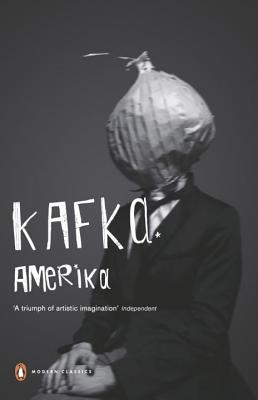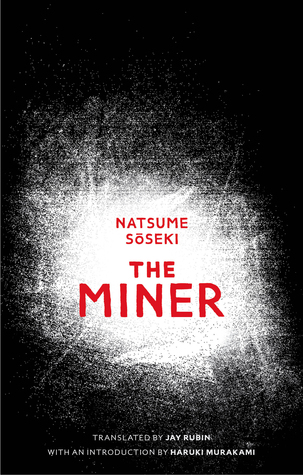 Given the sort of novels I generally go for, it will probably come as a bit of a surprise that this is the first Kafka novel I have ever finished. And given that I’ve never read Kafka before, my statement just now was based completely on the plot plot (i.e. plotting the shape of plots on a graph) of Kafka’s novels by Kurt Vonnegut (as seen in A Man Without a Country). To save you the work of tracking a copy down (though we do have it!), here’s how he described Kafka’s Metamorphosis:
Given the sort of novels I generally go for, it will probably come as a bit of a surprise that this is the first Kafka novel I have ever finished. And given that I’ve never read Kafka before, my statement just now was based completely on the plot plot (i.e. plotting the shape of plots on a graph) of Kafka’s novels by Kurt Vonnegut (as seen in A Man Without a Country). To save you the work of tracking a copy down (though we do have it!), here’s how he described Kafka’s Metamorphosis:
A young man is rather unattractive and not very personable. He has disagreeable relatives and has had a lot of jobs with no chance of promotion. He doesn’t get paid enough to take his girl dancing or to go to the beer hall to have a beer with a friend. One morning he wakes up, it’s time to go to work again, and he has turned into a cockroach... It’s a pessimistic story.
Who wouldn’t want to read that?*
*Says the person who hasn’t read it.
Granted, Metamorphosis is not what I’m going to be discussing this time. And while Amerika is not, arguably, quite as pessimistic a story as all that – and I say this despite the plot following a similar downward curve as described above – it’s definitely not all rainbows and lollipops. Owing to a family scandal, a young German boy on the cusp of manhood (which renders this something of a coming-of-age story) by the name of Karl Rossman gets disowned by his parents and sent off to America. Despite his aptitude for learning and his mix of good and ill fortune in turns – he has a knack for being noticed by people with some authority who use their power to help him, and yet it is as though there is an inexorable force dragging him back into misfortune that he does not quite resist – he appears to be perfectly happy going where the wind blows. Or perhaps it is that he is resigned to whatever situation he finds himself, which I suppose allows for a lot of flexibility in his life. (I think complacent is the word, to be honest. Not to say that he does not work hard – being hardworking is one of his main personality features – but there is most definitely a sort of complacency I associate with Karl.)
Amerika strikes me as a somewhat nightmarish account of an immigrant experience, where it is as though a descent into hell, complete with all the various levels Karl allows himself to fall into, little by little. It’s a bit like the foot-in-the-door technique (see Influence by Robert Cialdini if you’re interested in persuasion) that Karl gets swept up in, but there’s also this eerie sense of otherworldliness, where everyone is operating on principles and guidelines similar to the ones Karl recognizes, yet alien enough that he cannot quite grasp it with the same fluency as those he comes in contact with. I got a similar feeling from reading The Lottery and Other Stories by Shirley Jackson, which is a delightful – by which I mean strangely eerie; uncanny – collection of short stories that I would also encourage you to read. Somehow though, in spite of his entire journey, and I don’t know whether it’s resilience that we want to ascribe to Karl so much as an inability to be flexible in a different manner (than the complacency I mention above), Karl continues to dig a multitude of holes for himself, and I didn’t come away from the novel feeling much sympathy for him.
He’s a passive enough character that I almost want to liken to an NPC (non-playable character), who appears as though he’s more acted upon and thrown rather than placing himself into situations and choosing to do certain things over others. I suppose the main difference is that he chooses, in effect, to be thrown by the will of all those around him, which might not strike one as a choice at all, but I think it’s fair to say that his decision to go with the flow helps to generate the situations he falls into. And in the end, he decides by someone else’s reasoning that it’s better to stay in the level of hell he is currently in than try to get out and start being responsible for his own life (and risking falling even deeper into hell).
If you’ve read Amerika and are looking for something similar in content that similarly seems to go nowhere in particular, which is not, as I’m saying it, a bad thing per se, I’m going to direct you to The Miner by Natsume Soseki.
 We don’t currently have The Miner in our system, so I’ve actually linked you to our ILLO (Interlibrary LOan) service, which allows you to borrow items from other library systems via us, provided they have it and are able to fulfill your request. It takes a bit longer than a regular hold since the request has to go through two systems, and comes with its own guidelines and rules (see the link), but it’s definitely an option you have at your disposal whenever you find we don’t have something you’re looking for! (You also have the option of suggesting that we purchase the item so that we add it to our collection. There are no guarantees that we will be able to fulfill your request, but there’s no harm in sending us the suggestion!)
We don’t currently have The Miner in our system, so I’ve actually linked you to our ILLO (Interlibrary LOan) service, which allows you to borrow items from other library systems via us, provided they have it and are able to fulfill your request. It takes a bit longer than a regular hold since the request has to go through two systems, and comes with its own guidelines and rules (see the link), but it’s definitely an option you have at your disposal whenever you find we don’t have something you’re looking for! (You also have the option of suggesting that we purchase the item so that we add it to our collection. There are no guarantees that we will be able to fulfill your request, but there’s no harm in sending us the suggestion!)
Onto The Miner.
I’ve read a couple of Soseki’s other works, either in full (Kokoro and I’m pretty sure Kusamakura, though that one I cannot say with certainty) or abridged (I am a Cat, Ten Nights of Dreams), and The Miner definitely appears as a bit of an oddball in comparison with the others.** Murakami covers this in his introduction, so I won’t delve too much into that. Instead, let’s talk about why I’m introducing you to The Miner, which I found Amerika to be oddly reminiscent of. They have a number of similarities that struck me as almost uncanny:
- Kafka never meant for Amerika to be published, and Soseki’s The Miner was not well received throughout its publication as a serial novel. Now I’m not sure the reasons for either case, but it strikes me as odd.
- Although both stories seem to arrive nowhere, they’re both set up as a coming-of-age story for the young men who are the protagonists, though they definitely don’t follow what you might normally expect of a coming-of-age novel.
- I would argue both books portray a descent into hell, complete with various levels (that the protagonists allow themselves to slowly slip down)
- Both protagonists are complacent to what seems an abnormal degree, especially considering the fact that they are protagonists of a story – they’re antiheroes. I suppose you could say they’re easygoing?
- Even the issue that drives them out of their homes and out of their families to begin with is more or less the same!
To sum up, if you’d like to meander about in unfamiliar territory as far as expected novel plot shapes go, give Amerika and The Miner a try!
** Truth be told, I suppose I am a Cat doesn’t quite slot in all that nicely either? And Ten Nights of Dreams, too…)